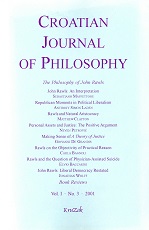Personal Assets and Justice:The Positive Argument
Personal Assets and Justice:The Positive Argument
Author(s): Neven PetrovićSubject(s): Philosophy
Published by: KruZak
Summary/Abstract: This article critically explores John Rawls’s contention that the personal assets ofindividuals, i.e. their mental and bodily powers, should not determine the size oftheir holdings. Since such an argument may have several forms, the first task is toestablish which of them Rawls himself advocates. He relies, it is argued, on a versionthat attempts to convince us that personal assets should not play a decisive distributiverole because they are undeserved. This account is then formally reconstructed, makingall the relevant premises visible and preparing the ground for a critique thatconcentrates on the argument’s separate steps. Coming under attack first is theclaim that everything should be deserved. The discussion examines next the premiseurging us to find an ultimate, indisputable ground for desert-claims. Debate aboutthis issue reveals some fundamental weaknesses in Rawls’s position: that he demandstoo much and is inconsistent; that some strong counter-intuitive consequences followfrom his demands; and that his entire project, were such a criterion taken seriously,is undermined. Final comments are directed against the assertion that the communityshould own everything an individual does not deserve, showing that this does notremove moral arbitrariness, allows for the use of some persons as resources forothers, and cannot plausibly limit its range of application. Most of these criticismsare not original, but are in accord with this paper’s main intention of combining asmany good points against Rawls as possible.
Journal: Croatian Journal of Philosophy
- Issue Year: I/2001
- Issue No: 3
- Page Range: 261-282
- Page Count: 22
- Language: English
- Content File-PDF

